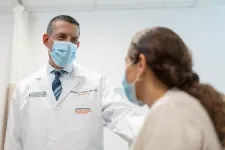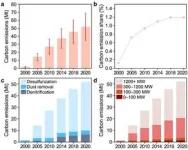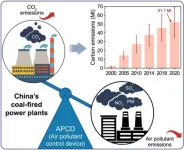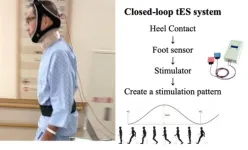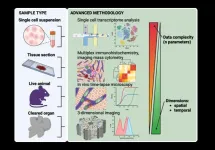(Press-News.org) MIAMI, FLORIDA (EMBARGOED UNTIL AUG. 8, 2023 AT 10 A.M. ET) – Blood disorders known as myelodysplastic syndromes/neoplasms (MDS) are difficult to diagnose – and are commonly misdiagnosed – putting patients at increased risk for treatment mistakes and other potentially harmful consequences, according to researchers with Sylvester Comprehensive Cancer Center at the University of Miami Miller School of Medicine and collaborating organizations.
Their findings, published Aug. 8 in Blood Advances, a peer-reviewed journal of the American Society of Hematology, highlight the vital need for strong coordination between clinicians and skilled pathologists to ensure accurate, timely diagnosis of blood cancers.
“We found that expert pathologists had major disagreements with local pathologists’ diagnoses in about 20% of overall cases,” explained Mikkael Sekeres, MD, chief of Sylvester’s Division of Hematology and corresponding study author. “Some patients were told they had cancer when they didn’t, or the opposite – that they did not have cancer when, in fact, they did. More importantly, we showed that misdiagnosed patients received the wrong initial treatment almost 10% of the time.”
The researchers noted that MDS, a collection of chronic and more serious blood disorders, has widely varying prognoses and a tendency to evolve into acute myeloid leukemia (AML). The syndrome is diagnosed in about four of every 100,000 people in the U.S. annually, resulting in 20,000 new cases. However, experts believe the actual number could be higher due to underreporting and misclassification.
Most new diagnoses occur in patients over age 60. Survival rates range from about a decade to less than one year, depending on disease severity and other factors.
Sekeres and collaborators compared the results from more than 900 patients enrolled in the National Heart, Lung and Blood Institute’s (NHLBI) National MDS Natural History Study, an ongoing cohort study conducted across 144 sites in the U.S. and Israel, and which Sekeres chairs. The study was designed to build a data and biospecimen repository to advance MDS knowledge. Participants are enrolled when they are suspected of having MDS – or diagnosed with it -- and scheduled for a bone-marrow biopsy as part of their care.
Local pathologists typically make the initial diagnosis using the World Health Organization’s classifications for MDS. Their findings are then reviewed by expert, central pathologists who either confirm or refute the diagnoses after reviewing bone marrow specimens, clinical data and laboratory results.
Central pathologists in the NHLBI study practice at tertiary academic medical centers and specialize in cancers of the blood and bone marrow, while the local pathologists are a more varied mix from community and academic centers.
For this study, the researchers compared local and centrally reviewed diagnoses to quantify rates and degrees of clinically meaningful differences among MDS categories. They also determined if misdiagnoses affected the provided therapy.
Findings
Key findings from the study included:
Approximately one-third of cases received diagnostic reclassification after central pathologists’ review.
One-fifth of MDS diagnoses were reclassified.
15% percent of the disagreements between local and central pathologists were the result of site miscoding errors by research coordinators, calling into question the accuracy of national cancer registries that include patients with MDS.
Treatment rates were lower in cases with diagnostic disagreement versus ones in which local and central reviewers agreed.
Misdiagnosed cases led to patients receiving inappropriate therapy in 7% of cases.
“Our findings highlight the vital importance of seeking expert opinions from National Cancer Institute-designated cancer centers, especially with rare blood and bone marrow cancers such as MDS,” said Sekeres.
He added that community-based oncologists and pathologists have more experience diagnosing common cancers, such as breast cancer, than rarer ones such as blood cancers. “They may miss subtleties that would cause them to question the verity of rarer diagnoses.”
Sekeres and fellow researchers also noted that their study has major implications for national registries and the Surveillance, Epidemiology and End Results (SEER) program.
“Our findings help to explain discrepancies in regional and national database reporting of MDS incidence rates, subtypes and outcomes,” he said. “Diagnostic disagreements, coding errors and evolving diagnostic guidelines call into question the accuracy of current population-based data.”
What’s the biggest takeaway? “Blood cancers are tricky to diagnose,” Sekeres said, “and require second opinions from highly specialized clinicians coordinating with highly skilled pathologists to ensure patients are accurately diagnosed and get the right treatment in a timely manner.”
# # #
DOI: 10.1182/bloodadvances.2023010061
Other Authors
The full list of contributing authors is noted in the research paper.
Potential Conflicts of Interest
Many of the authors disclosed funding from various sources. These disclosures are included in the paper.
# # #
END
To combat this issue, China has implemented various environmental regulations, including the widespread use of air pollution control devices (APCDs) in CFPPs. While APCDs have successfully reduced air pollutants, their electricity consumption has led to indirect carbon dioxide (CO2) emissions. The extent of these CO2 emissions has remained uncertain, prompting researchers to delve deeper into this overlooked environmental concern.
In a new study published in Volume 17 of the journal Environmental Science and Ecotechnology, researchers from Shandong University conducted a study revealing that the proportion of APCD CO2 emissions in total ...
Gait-related disturbances adversely affect the quality of life of patients with Parkinson’s disease (PD), a condition affecting millions worldwide. Although various pharmacological, surgical, and rehabilitative treatments exist, their effectiveness is limited. Now, a team of researchers from Japan has successfully addressed this limitation. Using a novel neuromodulation approach that incorporates gait-combined closed-loop transcranial electrical stimulation, the team demonstrated significant gait improvements in patients with various neurological disorders including PD.
Parkinson’s disease ...
Pollinosis, or hay fever, makes people miserable around the world, and Japanese cedar (Cryptomeria japonica) pollen is a significant cause of the suffering in the 38.8% of Japanese people who are allergic. Japanese cedar is also the country's most important timber species. A single mature tree produces on the order of three hundred million grains of pollen. Saneyoshi Ueno and colleagues investigated the genes required to produce this massive amount of genetic material. Previous research by Ueno’s team identified ...
SAN ANTONIO — August 8, 2023 – Southwest Research Institute is launching its new Engine for Automatic Biomechanical Evaluation (ENABLE™) markerless biomechanics system during the American Society of Biomechanics (ABS) Annual Conference, August 8-11, in Knoxville, Tennessee. ABS attendees can see a demonstration by visiting Booth No. 11.
ENABLE is a user-friendly markerless motion capture system that leverages artificial intelligence, computer vision algorithms and biomechanical modeling. The key advantage of ENABLE is it efficiently captures ...
This review manuscript highlights the relevance of spatially-resolved macrophage phenotyping in liver disease-related research.
The liver is a vital organ heavily populated with macrophages, which represent key players of the innate immune response but also hold key functions in the maintenance of a healthy organ. Liver macrophages are mostly distributed across two populations of different origins and functions during homeostasis and disease: liver resident macrophages (referred to as Kupffer cells, KCs), and monocytic macrophages derived from the bone-marrow (MoMFs). The KC: MoMF ratio, as well as their respective spatial distribution through the liver, are increasingly ...
A study looks at the mechanisms behind genetic variation in the bacteria that cause Lyme disease. Lyme disease is the most common vector-transmitted disease in the United States, with around 476,000 human cases annually. Most Lyme disease is caused by the bacteria Borrelia burgdorferi (Bb), which is transmitted by ticks and can infect a wide range of mammals and birds. Matthew Combs and colleagues analyzed the genetic diversity of Bb, specifically focusing on the pathogen’s outer surface protein C (ospC) gene, a well-known virulence factor that is essential for survival of the pathogen inside the tick and the early stages of infection in vertebrates. ...
***Embargo 14:00 UK / 10:00 BRT / 9:00 ET / 6:00 PT Tuesday, August 8, 2023***
SEATTLE, Wash. August 8, 2023 – 569,000 deaths were linked to bacterial antimicrobial resistance (AMR) in all 35 countries of the WHO Region of the Americas, according to a new peer-reviewed paper published in The Lancet Regional Health – Americas. This analysis on the burden of AMR in the Americas is the most comprehensive yet for the region, providing data for 35 countries, 23 bacterial pathogens, and 88 pathogen-drug combinations.
The ...
Humans are social creatures and learn from each other, even from a young age. Infants keenly observe their parents, siblings or caregivers. They watch, imitate and replay what they see to learn skills and behaviors.
The way babies learn and explore their surroundings inspired researchers at Carnegie Mellon University and Meta to develop a new way to teach robots how to simultaneously learn multiple skills and leverage them to tackle unseen, everyday tasks. The researchers set out to develop a robotic AI agent with manipulation abilities equivalent to a 3-year-old child.
The team has announced RoboAgent, an artificial intelligence agent that leverages passive observations and active ...
Every year in the United States, about 1.7 million youth run away from home, which places them at risk for sex trafficking and prostitution. Sadly, most youth tend to fall victim to sex trafficking between the ages of 12 to 14.
While federal and state laws have been enacted to protect these runaway youth, they continue to be arrested, charged and detained for prostitution. Detaining youth who should not legally be considered offenders and who have extensive histories of victimization and mental health issues only exacerbates their underlying vulnerabilities that may have led them to run away or be sexually exploited in the first place.
There is ...
Insilico Medicine (“Insilico”), a clinical stage generative artificial intelligence (AI) drug discovery company, has announced that it is now a member of the Chamber of Commerce of Metropolitan Montreal, demonstrating its commitment to the vibrant business community of Montreal and to fostering economic growth in the region. Insilico will officially launch its AI R&D Center in Montreal later this fall.
As a new member of the Chamber of Commerce of Metropolitan Montreal, Insilico brings its innovative expertise ...
